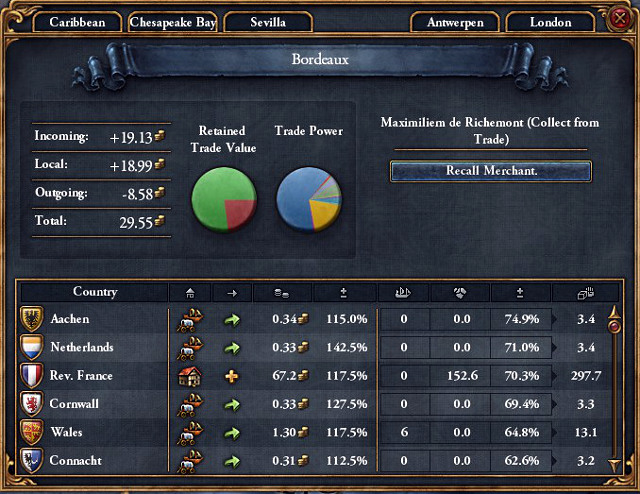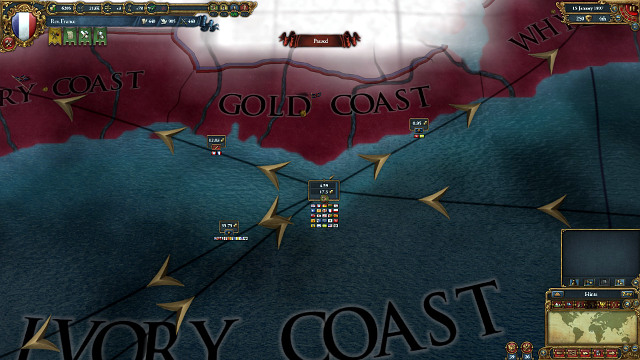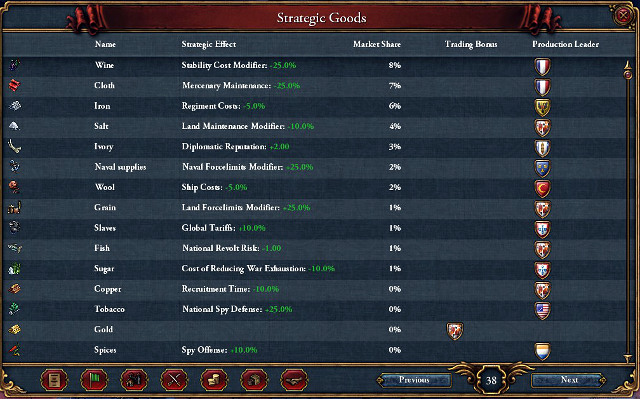Europa Universalis 4: Trade control

To control trade, you use merchants. There is a base number of two per each country. This number can be increased through ideas (especially Trade that provides three extra merchants) and decisions. Furthermore, merchant republics have one more base merchant. You dispatch merchants to trade nodes (only within your trade range modified by diplomatic technology and ideas), where they attempt to seize as much control over the local trade route as possible.
You can order a merchant to do either of two things:
- Collect money
- Steer the trade, conforming with the route, over to the next center
The larger your control over a given trade node, the larger percentage of the money, coming from the total, you receive. What you want to do, then, is establish a transfer route from the starting point A, through B, to C, where you have great control and where you are going to collect the money (much more than if you collected it in points A and B, where your share in the market is low). How much money you are going to collect for yourself, depends on the current trade power.

Trade Power is a key factor of how much you actually are going to get. Note that it is not a value that has bearing on the amount of money in a node (that is what trade value is for). Trade power determines how much of the entire pie you are going to get. This value varies for each trade center (although some modifiers, e.g. for high stability, are global for all nodes). Trade power depends on the following factors:
- Provinces, the more provinces you have in a given region, the higher the trade power, for the local node, you are going to generate. That is why it is immensely important to hold a stronghold in the distant regions e.g. in very rich India. Additionally, coastal provinces in the middle of the trade are going to generate higher TP than the remaining ones. Erecting new buildings also increases TP.
- Mercantilism. The current percentage multiplied by two is an additional TP generated by each province. Mercantilism can be modified by means of events.
- Half of the Trade Efficiency is an additional percentage of the Trade Power. Efficiency cannot exceed 200% (i.e. 100% of TP)
- Modifiers of the idea, system advisors, stability.
- Merchants, Each merchant increases TP by 2 in the region that he has been dispatched to.
- Trade steering. A merchant that sends money on, increases Trade Power in the next center. The effects cumulate, up to five merchants. And so, the first one increases trade power by 20%, the second one by 30%, the third one by 36.6%, fourth by 41.6% and fifth by 45.6. Note that merchants do not need to (and technically speaking cannot) be from the same country. This is the basis for establishing a good trade node. Send money from the weaker nodes, to the ones where you have a bigger share to increase income generated there. Determine how to best establish a transfer to maximize profits. A good solution will be to establish e.g. two three-layer node. But, sometimes, one long node, or three shorter ones, may turn out to be a better solution. Remember about transferring your money to the appropriate node! It is an element that is easy to overlook. Note that, in the above screenshot, directly next to the trade center in Gold Coast, right on the routes, there are small windows. Clicking any of these selects the direction in which you want to transfer money. And so, in the screenshot, money is being transferred to the North-East towards Mauretania, and on to Seville. It is easy to make an oversight here, which will result in money being sent into completely different trade point where you do not have any merchants, and in wasting all money! So, make sure that your node sends your money in the correct way.
- Ships. Each light ship that patrols the sea trade route increases the generated trade power. The base value is 3 per each ship but, this amount increases with each better ship model. It is an immensely effective way to increase income from trade so, build big fleet and try to determine, manually, the ratio of the number of ships to the navy financing in the budget that generates the highest income. The better you finance the navy, the better this influences the income from trade. So, it may turn out that it is more economical to spend more money on the navy, than make apparent savings by curbing the financing.
You should collect money where it is most effective after the establishment of the entire node, i.e. it is the ideal situation when it is a trade node with high trade value from production and from steering, and also very high trade power coming from market control (the more negligible the competition the easier it is to control, you will receive a lion's share in the market, somewhat by default, in the nod that your Capital belongs to.
Eventually, the game puts a merchant in the trade center of the capital to collect money there. Money in the capital is always collected automatically and the merchant presence modifies it only by 10%. Therefore, the most effective solution is to remove the merchant from there and put him in another node that you have strong control over. You need to take into consideration the fact that this will pretty much decrease the local trade power there but, if it still stays on a high level, this will be anyways more effective than the additional 10% from the capital. In general terms, a good solution for trade are two transfer routes, one that ends in the center that the capital belongs to and the other ending in another center, which you exercise vast control over.
Embargo
To maximize your share in a trade center, you can consider imposing embargo on another country. Embargo will decrease this country's trade power in nodes, in which both of you have trade power. This will increase the income of the remaining countries from these nodes. The imposed penalty is a half of the owned TP in any other trade center. I.e. the more power you have over a given center, the more effective the embargo is. Embargo effectiveness can be additionally increased by 33% by the Privateers idea from the Espionage group. Furthermore, England has a national idea that increases the effectiveness of embargo by 100%.
Embargo wil come with the decrease in the opinion of the other country by 15. Furthermore, each imposed embargo decreases trade effectiveness by 5%. This penalty can be avoided if you name another country your opponent.
Strategic goods

For controlling the market of certain goods, you can receive special bonuses. If you are the leader of the world production, you will receive a 10% rise to the production of these goods. If you, on the other hand, control at least 20% of the world trade of these goods, you will receive a special bonus, which depends on the type of the goods. These bonuses are really big and worth obtaining. For example, controlling grain market, will increase the limit of the army by 25%, and controlling wine market wil decrease stability cost by 25%. Gold is the exception here because it provides no bonus. You can find detailed information about that in the log (Hotkey -L).
You are not permitted to copy any image, text or info from this page. This site is not associated with and/or endorsed by the developers and the publishers. All logos and images are copyrighted by their respective owners.
Copyright © 2000 - 2026 Webedia Polska SA for gamepressure.com, unofficial game guides, walkthroughs, secrets, game tips, maps & strategies for top games.
